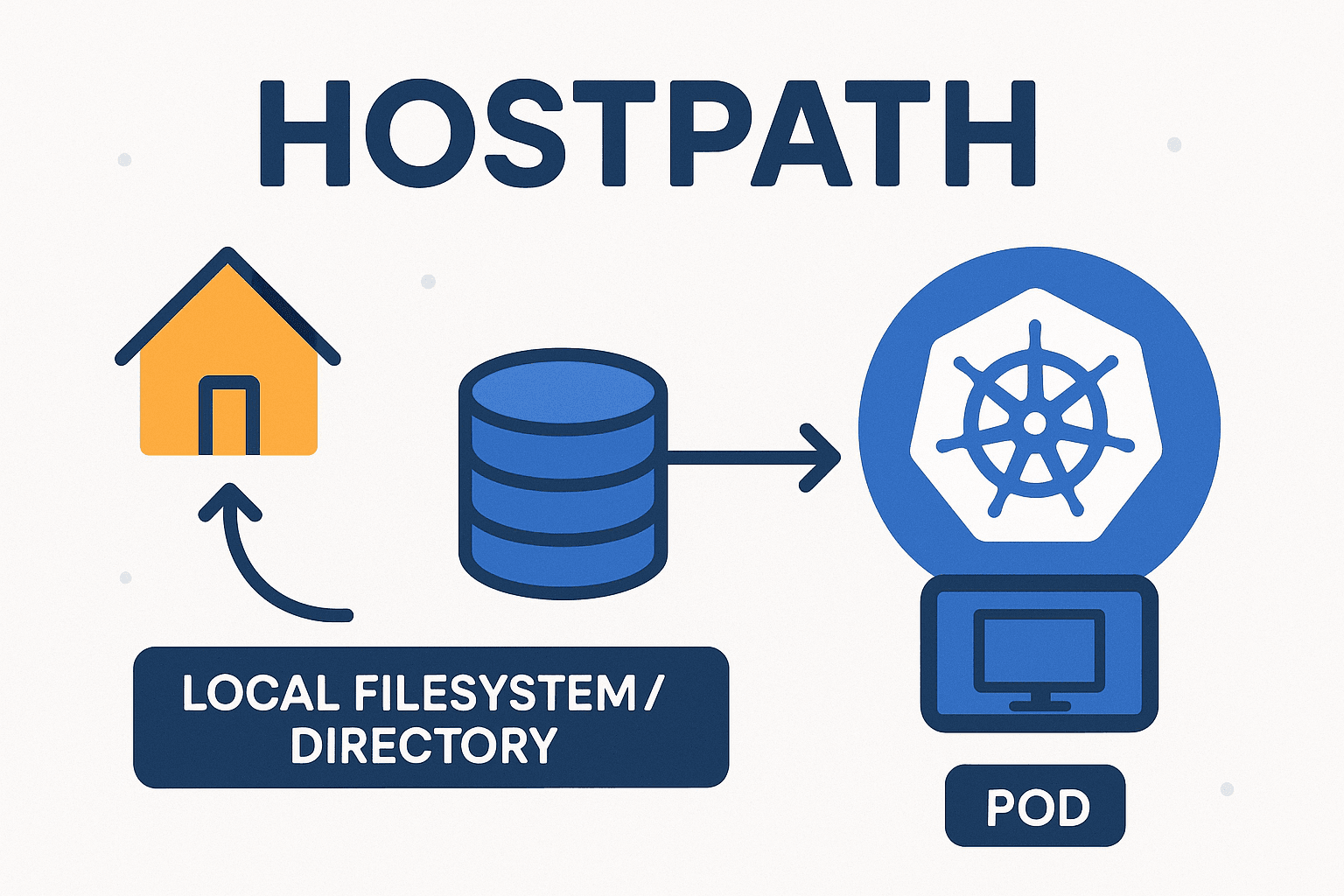HostPath
Terms related to simplyblock
In Kubernetes, a HostPath volume lets a pod mount a file or directory from the host node’s filesystem. It’s a low-level way to give containers access to node-local files like logs, container runtimes, or host-specific tooling. While this setup can be helpful in narrow scenarios, it introduces security risks and tight node coupling that make it unsuitable for most production workloads.
Unlike persistent storage that can move with your apps, HostPath binds the pod to a specific machine, breaking Kubernetes’ abstraction of storage and limiting flexibility.
How HostPath Works in Kubernetes
HostPath is configured directly in a pod spec. You define the path on the host (e.g., /var/log), and Kubernetes mounts it into the container at runtime. Kubernetes doesn’t manage or create that path—you’re responsible for making sure it already exists on every node that might run the pod.
There’s no provisioner, no replication, and no scheduling awareness. If the pod moves to a different node, it simply loses access to the volume.
Kubernetes supports volume types like HostPath, ephemeral volumes, and persistent volumes that work with CSI drivers for better portability and automation.
🚀 Tired of Managing HostPath Workarounds?
Simplyblock gives you portable, production-grade volumes—no node lock-in or manual configs.
👉 Use Simplyblock Instead of HostPath →
When It’s Acceptable to Use HostPath
HostPath can still make sense in very specific use cases tied to the node itself:
- Monitoring agents collect logs from
/var/log - Containers accessing Docker or containerd sockets
- Dev clusters using Minikube for testing
- CI/CD agents needing fast local I/O
In each case, the workload is closely tied to the host, not meant for portability or scale. These scenarios rarely require features like dynamic provisioning, but anything outside of them usually does.

HostPath Limitations That Matter
For general workloads, HostPath introduces several deal-breakers:
- Node lock-in: If the pod is rescheduled, storage doesn’t follow
- Manual path setup: Every node must be configured consistently
- No dynamic provisioning: Volumes are static
- Security risks: Improper configurations can expose system files to containers
- No durability: No replication or data protection
These downsides are especially critical in environments that rely on high availability, disaster recovery, or automated scaling.
HostPath vs Persistent Volume
While both provide storage to pods, they work in fundamentally different ways. Understanding those differences is key to choosing the right option for your workload.
| Feature | HostPath | Persistent Volume (PV) |
|---|---|---|
| Portability | Node-bound | Cross-node (cluster-scoped) |
| Provisioning | Manual | Automated via CSI drivers |
| Security Controls | Minimal | RBAC, CSI integration |
| Replication | Not supported | Backend-dependent |
| Best For | Host-specific tools | Stateful, resilient apps |
If you’re running anything beyond diagnostics or single-node jobs, PVs provide better durability, scale, and scheduling.
Why HostPath Is a Poor Fit for Stateful Workloads
Kubernetes is designed to abstract compute and storage layers. HostPath breaks that design by anchoring your data to a physical machine.
That’s a problem if you’re running apps that need to survive node failures or restarts. For example, Kubernetes backup workflows or database clusters often need volumes that persist across nodes. HostPath can’t handle those scenarios without major compromises.
How Simplyblock Solves What HostPath Can’t
HostPath is limited by design. Simplyblock is built to go beyond those limits.
With CSI-based block storage, Simplyblock supports:
- Cross-node volume portability
- Instant snapshots and rollbacks
- Automatic scaling with your cluster
- Secure, tenant-aware volume policies
Whether you’re deploying performance-critical databases or architecting high-availability apps, Simplyblock gives you production-grade storage without manual setup or node-specific hacks.
Should You Still Use HostPath?
Only if there’s no better option.
HostPath is fine for dev tools, log scraping, or edge-case debugging—but for anything involving real data or uptime guarantees, it’s too risky.
Persistent volumes backed by CSI drivers are now the standard for a reason: they scale, recover, and integrate well with how Kubernetes was meant to run.
Related Terms
Teams often review these glossary pages alongside HostPath when they decide whether node-local mounts are acceptable or if they need a portable, CSI-backed storage backend.
Questions and answers
While HostPath allows Kubernetes to mount a file or directory from the host node into a Pod, it’s risky in production. It bypasses volume abstraction, introducing security issues and limiting portability. For secure, scalable alternatives, explore Kubernetes-native storage solutions like Simplyblock.
HostPath volumes expose the host file system to containers, which can lead to data leakage, permission issues, or accidental host modifications. It’s typically reserved for testing or highly trusted internal environments. Secure storage options are better suited for multi-tenant clusters.
Technically, yes, but it’s not advisable. HostPath volumes are node-dependent, so if the pod reschedules to another node, the volume won’t follow. For persistent, reschedulable storage, use a CSI driver like Simplyblock’s CSI integration.
HostPath directly accesses the host file system, while PVCs are provisioned through Kubernetes storage classes, offering better abstraction, scheduling, and security. For production-grade PVCs with NVMe performance, check out Simplyblock’s storage engine.
HostPath can be safely used in controlled testing environments or for system-level workloads like logging agents. But for data workloads, databases, or user-facing apps, opt for secure, dynamic volumes provisioned through software-defined storage.
